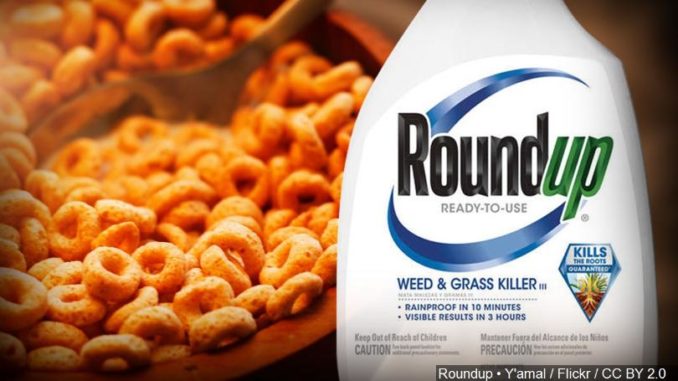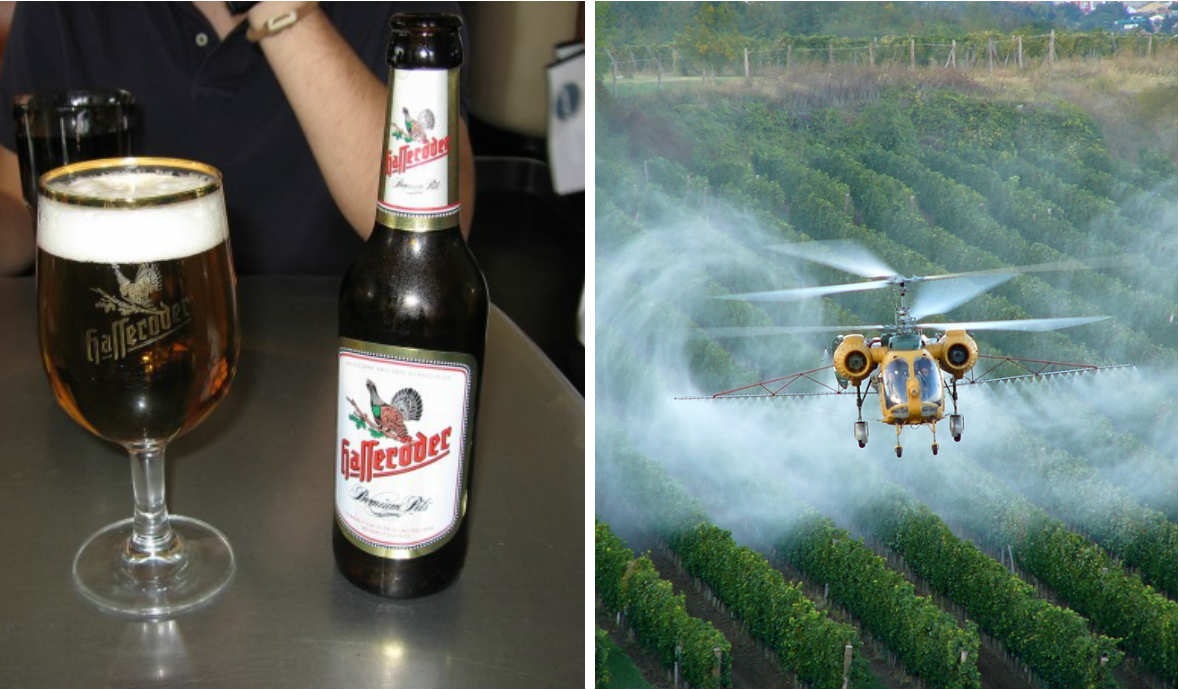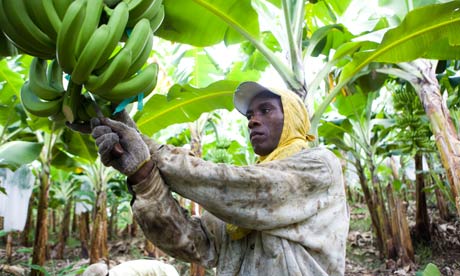Traces of Weed Killer Roundup Glyphosate Found in Beer & Wine, Some Organic Brands
"Consumer Group Finds Traces Of Weed Killer In Beer And Wine," CBS News, Feb. 24, 2019. *EXCERPTS:
As more lawsuits claiming a link between Roundup and cancer move forward, a new report claims the main ingredient found in the weed killer is showing up in organic beer and wine.
U.S. PIRG tested samples of popular beer and wine brands and found the chemical, called glyphosate, in 19 out of 20 brands. Glyphosate is the main ingredient in Roundup, produced by agrochemical giant Monsanto. Sutter Home Merlot had the highest level of the weed killer of all 20 brands, at 51 parts per billion (ppb). Beringer Estates Moscato and Barefoot Cabernet Sauvignon had slightly smaller quantities of the chemical.
Corona, Miller Lite and Budweiser had between 25 and 30 ppb of the substance; Guinness and Heineken contained about 20 ppb. "If we're finding this level of glyphosate in wine and beer, even when we know the makers aren't using glyphosate, that to me indicates there's glyphosate in a lot of other products," Kara Cook-Schultz, U.S. PIRG's toxics program director, told CBS News. Peak Beer was the only tested brand that showed no levels of the chemical.
Organic brands also affected: PIRG's investigation also found traces of the weed killer in some organic brands, which are forbidden from using most chemicals in food production. That doesn't mean these producers were circumventing the rules, but rather that glyphosate is so prevalent in the environment it can be hard to avoid, Cook-Schultz said. "[At] the levels we found, I suspect they're not using glyphosate," she said of the organic producers, noting that the chemical could be carried to organic fields by irrigation water or could be present in the soil.
>The Environmental Protection Agency does not test for glyphosate in food products. But in recent years, tests by nonprofits and advocacy groups have found the chemical in cereals, snack bars and some Ben & Jerry's ice cream.
First developed by Monsanto (which merged with German pharmaceutical company Bayer last year) in the 1970s, Roundup has been the most widely used herbicide in the U.S. for nearly 20 years. How much is too much? California regulators have called glyphosate a "probable carcinogen," and France banned a version of Roundup last month due to health concerns. Monsanto maintains that glyphosate is safe. It will be defending that position in a lawsuit brought by a 70-year-old man alleges that the herbicide led to his cancer diagnosis in 2015. -MORE...
http://www.msn.com/en-us/health/health-news/consumer-group-finds-traces-of-weed-killer-in-beer-and-wine/ar-BBU4Bb3?li=BBnba9O&ocid=HPCOMMDHP15
Related: "Weed Killer Found in Wide Range of Breakfast Foods Aimed At Children." Cancer-linked herbicide, sold as Roundup by Monsanto, present in 45 products including granola, snack bars and Cheerios, The Guardian, Aug. 2018.
https://www.theguardian.com/environment/2018/aug/16/weedkiller-cereal-monsanto-roundup-childrens-food



Dickster
(103 posts)The chemical to be sprayed on wheat and barley crops right before harvest. This allows farmers to kill any weeds that may hamper harvest and it accelerates the ripening process. So the Roundup is applied to nearly ripe grain right before harvest. There is an interval that farmers are supposed to wait before harvest, but it is usually only a few days. This is why the Roundup is showing up in the tests. It is applied too close to harvest to allow degradation. This needs to stop. Before Roundup came along, farmers had to wait a little longer to harvest, but it got done. I blame a lot of this on the “git er done” mentality of a large portion of today’s farmers.
And before I get flamed again for commenting on Monsanto issues, I’ve been a farmer for 44 years, so I’ve been around the block with Monsanto...
voteearlyvoteoften
(1,716 posts)For convenience!!
appalachiablue
(41,132 posts)at the end to help with harvesting but not that it was being abused by farmers and getting into the food chain. That must stop somehow.
You may be familiar with this awful situation with Kepone used for banana weevil and subsequent contamination in the French West Indies. Illnesses including high rates of prostate cancer, breast cancer and birth defects, and precautions will impact locals in Martinique and Guadeloupe for six hundred years. A beautiful French Island, glad I didn't know this about Martinique when we visited in the late 90s.

>"Pesticide threat looms over French West Indies." Martinique & Guadeloupe affected by chlordecone. The Guardian, July 2010. France is once again embroiled in a health and safety scandal. For 20 years, from 1973 to 1993, the insecticide chlordecone (Kepone) was used in Martinique and Guadeloupe, in the French West Indies, to combat banana weevil, exposing a significant proportion of the population and polluting the soil. A study published last month in the Journal of Clinical Oncology and in Guadeloupe confirms that chlordecone, which disrupts the endocrine system, is responsible for a significant increase in the risk of prostate cancer, the cause of half the cancers detected on the two islands.
"Huge mistakes were made, horribly reminiscent of the key public health issues of the 1980s and 1990s, particularly growth hormones and BSE," says Professor William Dab, the head of the Science Committee for the Martinique and Guadeloupe Chlordecone Plan. The product was banned in mainland France in 1990 but special provision was made for its use to continue in the Antilles until 1993. It had been banned in the US since 1976. Martinique and Guadeloupe must now cope with massive contamination of soil, river water and sediments by a substance that remains toxic for centuries.
"About 80,000 people live in areas were the soil is contaminated and 13,000 absorb more chlordecone than the reference dose per day, simply by eating their own vegetables. We must help local people learn how to live with a problem which is here to stay: the half-life of chlordecone in the ground – the time it takes half the quantity present to disappear – is 600 years," Dab says...https://www.theguardian.com/world/2010/jul/13/france-pesticide-health-scandal-chlordecone
Blue Owl
(50,374 posts)We are killing ourselves!
![]()